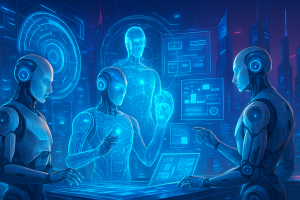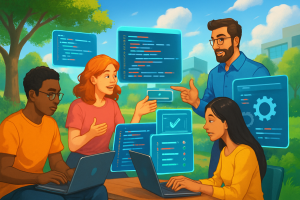How often do you find yourself arguing which programming language is superior? In today’s world, when the software industry is experiencing an influx of so many technologies, it is a futile attempt to side with a particular programming language. Experts believe that an average developer must know at least three programming languages.
Therefore, if you wish to become a successful programmer, you must learn more than a single programming language. You can start with any language of your choice, and as you master its concepts, you can proceed to learn more programming languages that will further your career.
At Talent500, when vetting developers to join global companies, we evaluate their skills, not on single but multiple technologies. For instance, a front-end developer must know HTML, CSS, JavaScript, and other JS frameworks. In contrast, a back-end developer should learn scripting languages like PHP, Python, Ruby, APIs, and JavaScript. It is essential as Fortune 500 companies and fast-growing startups want candidates with a broad skill set. To know more, join us.
In this article, we are sharing important reasons why a developer should learn multiple programming languages.
1. Learning multiple languages help you expand your horizon
A programmer working with multiple languages never suffers from tunnel vision. The more programming languages you know, the more benefits, drawbacks, similarities, and differences appear.
A common problem with programmers who only work with a single programming language is that they only find a particular way of doing things as the “right way” or the “best way,” when certainly, in software development, the same problem can be solved with several approaches.
For instance, in the example below, both JavaScript and Go take wildly different approaches toward error flow:
// JavaScript
try {
doSomethingDangerous()
} catch (err){
console.log(err)
}
// Go
err := doSomethingDangerous()
if err != nil {
fmt.Println(err)
}
It’s hard to argue which approach is better here as both have applications in different scenarios. While the JavaScript approach is better for browser rendering, Go offers a better approach to use in enterprise software.
When you learn multiple programming languages, you develop a deeper understanding of each technology and are better positioned to use the best technology for the job.
2. Your skills never get outdated
When you follow a trending tech to upskill, you are risking your progress. With programming skills, you never know when a change will render the skill redundant. For instance, Flash was once a major force in web development. Still, it is an outdated technology today as HTML5 and other web technologies have made it easier to use multimedia on web pages.
In the software development industry, it’s challenging for a programming technology to remain in power. If you are a developer with skills in only one language, you can find it hard to be adaptable to the changing needs of the industry. When you have multiple programming skills, you are a versatile candidate and will get far more opportunities than programmers who only know a single programming language.
Another reason to keep learning new programming languages is that it opens up more options for moving up in your career. Suppose your company decides to bring in new technology or change course. In that case, if you are already skilled in that particular opportunity, you will be in a position to negotiate better promotions and benefits.
Learning more programming languages makes you a versatile developer, and your skills never get outdated. You adapt to industry changes quickly and keep finding varied and fresh job opportunities.
3. Better salary increment potential
Monetary gain is one of the essential motivators for learning new skills. And it’s true that the more programming languages you know, the more money you will make. According to Pluralsight, most companies are looking for developers who can work with more than one technology and are willing to pay more than average developers.
Mary Branscombe, a technology journalist with Pluralsight, says, “…companies are prepared to pay more to get someone who can switch between projects and has three or four programming languages at their fingertips. They’re prepared to pay up to a year more for developers who can work in multiple languages.”
Taking an industry example, YouTube is a product company that uses a stack of different programming languages to offer its services. For the front-end, it uses JavaScript, its back-end is built using C, C++, Python, Go, and Java, and for the database, it uses Bigtable, Vites, and MariaDB.
The same is with every other big tech company – Google, Twitter, Netflix, Facebook, Dell, etc. – they all use multiple technologies in their products. Engineers working with these companies and drawing huge paychecks are expected to know various programming languages.
Conclusion
If you are not compelling yourself to learn new programming skills, you are limiting your growth and risking becoming obsolete. We hope this guide will help you understand why learning multiple programming languages is necessary to maximize your potential as a developer.
Talent500 offers career-redefining opportunities for developers. Join us to explore the best offers in the industry.



